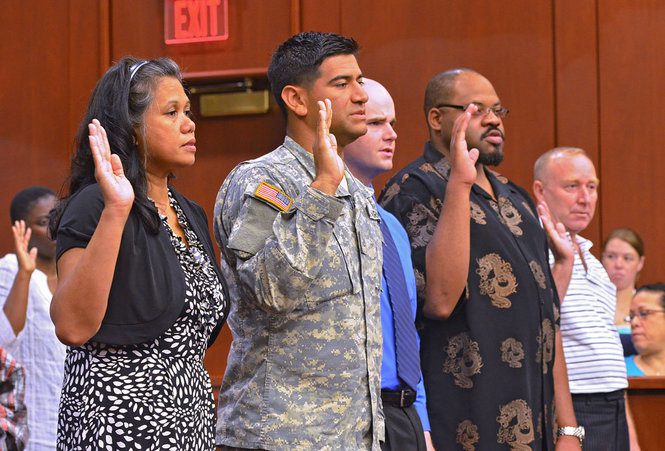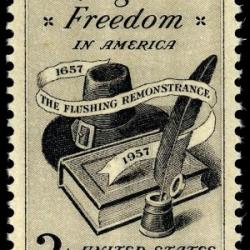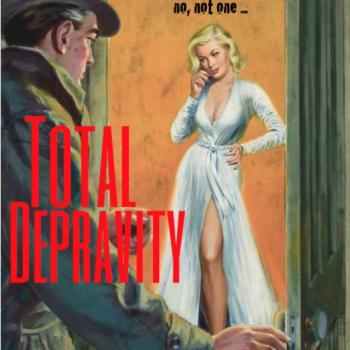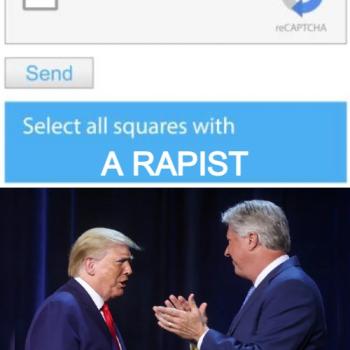Hemant Mehta says to President Obama: “When you take the oath of office, don’t say, ‘So help me God.’”
Mehta rightly points out that this phrase is not part of the oath — which pledges to “preserve, protect and defend the Constitution,” a thoroughly secular document. And he notes that Washington, Adams, Jefferson, Lincoln and every other president up until Chester A. Arthur in 1881 managed to be sworn in without the phrase.
Mehta quotes from Andrew Seidel of the Freedom From Religion Foundation, expressing that group’s reasons for avoiding this religious phrase:
For secular America, religious rhetoric is empty. Religious justifications for government action are hollow arguments invoking an authority that we reject. Politicians often use religion to pander to their base, but we find such rhetoric exclusionary and distasteful.
I’d urge Seidel to … well, not “find such rhetoric exclusionary and distasteful.” It would be both of those things if that sectarian phrase were mandatory — if it were imposed on every official regardless of their personal beliefs. But it’s not mandatory.
Contrast the presidential oath with the Oath of Allegiance for new citizens in the United States. That oath includes the mandatory phrase “so help me God.” How requiring that phrase of every new citizen is supposedly reconcilable with the First Amendment is a mystery to me. That, I think, is exclusionary and distasteful.
I also don’t understand why the oath for new citizens needs to be more than three times longer than the oath taken by the president. I’d pare the thing down to its two essential clauses: “I will support and defend the Constitution and laws of the United States of America [and] I will bear true faith and allegiance to the same.” Period. That would correct the current oath’s violation of the Establishment Clause while also making the whole thing less creepy in general.

With regard to the swearing-in of the president, though, the essential point here is that, at this time, Andrew Seidel is not the person being sworn in. Barack Obama is. And Obama believes in God.
If Obama voluntarily chooses to add the phrase “So help me God,” then Obama is the one making the affirmation. It doesn’t matter whether anyone else believes in God, and it doesn’t matter whether or not that belief is correct for whatever value of “correct” Seidel or Franklin Graham or anyone else cares to argue. If uttering the phrase “So help me God,” emphasizes the gravity and seriousness of Obama’s oath — for him, personally, and thus for all witnessing him — then it’s just kind of weird to take offense at that.
Seidel’s objection that Obama’s use of this phrase would be “exclusionary and distasteful” parallels the protests from Christianists after Rep. Keith Ellison reaffirmed his oath of office with his hand on a copy of the Koran once owned by Thomas Jefferson. I expect to hear the same whining in January when Tulsi Gabbard is sworn in as a member of the U.S. House from Hawaii. Gabbard is Hindu and has said she plans to take her oath on the Bhagavad Gita.
I’ve never understood the objection to that. I want Ellison and Gabbard to take their duty as public servants seriously, so I want them to take their oath of office as seriously as possible. The Koran is sacred to Ellison, so it is, for him, an appropriate expression of that seriousness. One does not have to share Ellison’s Muslim faith to appreciate that. The Gita, likewise, is sacred to Gabbard and is thus an appropriate expression of her seriousness. One does not have to share Gabbard’s Hindu faith to appreciate that.
Barack Obama is a Christian for whom the invocation of God is sacred. And so the phrase, “So help me God” may be, for him, an expression of the seriousness with which all people — Christian, atheist, Muslim or Hindu — ought to want to see him take that oath.
All of these public servants are being sworn into offices which are, and must be, thoroughly secular. That means, among other things, that there can be no religious test for any such office. That, in turn, means that no public servant can be compelled or required to take an oath on the Christian Bible, or on the Islamic Koran, or on any other sacred text. But it also must mean that no public servant can be prohibited from affirming that which they hold sacred.
Secular government affirms religious pluralism, as only secular government can.
As for me, personally, I’m a Baptist. That doesn’t mean I would want to be sworn in on a Bible that was once owned by Roger Williams, but rather that I’m leery of swearing any oath at all. I think it’s inappropriate to signify the sincerity of any such oath by placing my hand on a book that contains these words:
Again, you have heard that it was said to those of ancient times, “You shall not swear falsely, but carry out the vows you have made to the Lord.” But I say to you, Do not swear at all, either by heaven, for it is the throne of God, or by the earth, for it is his footstool, or by Jerusalem, for it is the city of the great King. And do not swear by your head, for you cannot make one hair white or black. Let your word be “Yes, Yes” or “No, No;” anything more than this comes from the evil one.
The Constitution happily accommodates those of us who hail from oath-averse traditions, providing allowance for us in the text of the presidential oath: “I do solemnly swear (or affirm) that I will faithfully execute the office …”
But then, being a Baptist, I don’t think I have the right to insist that everyone else believe the same thing I do. So when Rep. Ellison affirms the solemnity of his oath by placing his hand on the Koran, or when soon-to-be Rep. Gabbard affirms the solemnity of her oath by placing her hand on the Gita, or if President Obama should affirm the solemnity of his oath by adding, “so help me God,” I think it best to respect those choices and thereby to respect them as people, and to appreciate that what matters on such occasions is the seriousness and sincerity of the official and not the sectarian particulars used to signify it.












